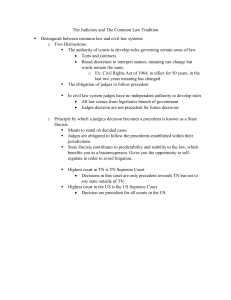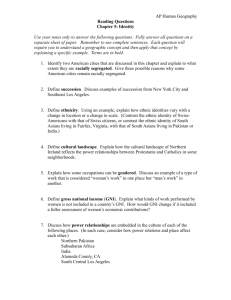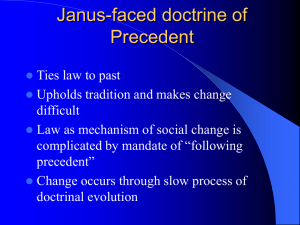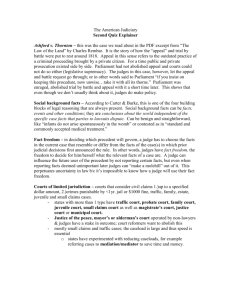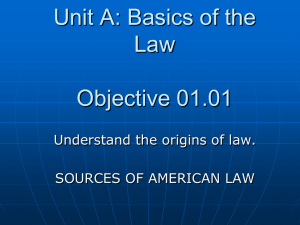Economic Growth and Legal Systems
advertisement
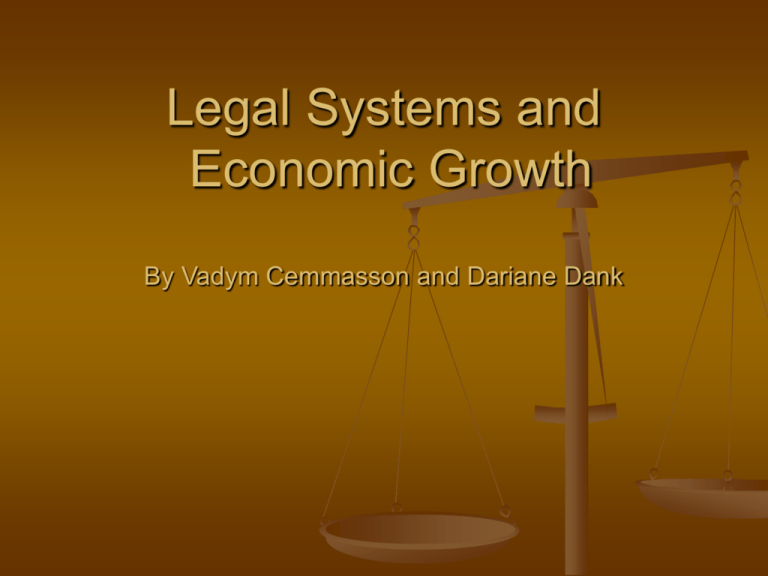
Legal Systems and Economic Growth By Vadym Cemmasson and Dariane Dank Legal Systems Three major legal systems Civil Law (France, Germany, Italy, Brazil, Mexico, Russia) (80) Common Law (GB, USA (-Louisiana), Canada (- Quebec), Australia) (23) Religious Law (Afghanistan, Saudi Arabia, Maldives Islands) (4) Legal Systems Legal Systems Civil Law The oldest and most widespread system of law in the world Based on Roman law especially Corpus Juris Civilis (“Body of Civil Law”) -> compiled to the code under the Byzantine Emperor Justinian Prominent example: Code Civil is the French Law Code established by Napoléon Bonaparte (Code Napoléon) Civil law is interpreted by judges rather than developed or made by them Legal Systems Common Law System of law whose sources are the decisions in cases by judges Legislature passes new laws and statutes -> do not amend a collected and codified body of law Developed in England and influenced by the Norman conquest of England (William the Conqueror) Inherited by the Commonwealth of Nations (adopted by almost every former British colony) Magna Carta -> fundamental document (limited on the power of the English Kings) Stare decisis -> major difference to civil law system Legal Systems Religious Law Refers to the notion of a religious system or document being used as a legal source The use of Jewish Halakah for public law -> precluding amendment through legislative acts of government or development through judicial precedent Christian Canon law is more similar to civil law Islamic Sharia law is based on legal precedent and reasoning by analogy Legal Systems Pluralistic Law Civil law and common law (Israel, Philippines) Civil law and religious law (Iraq, Iran, Egypt) Common law and religious law (India, Bangladesh) Legal Systems Comparative Law The study of differences and similarities between the law in different countries. Separate branches of comparative law: Constitutional law Administrative law Civil law Commercial law Criminal law Legal Systems International Law The system of implicit and explicit agreements that bind together nation-states in adherence to recognized values and standards. It primarily concerns states rather than private citizens Public international law Private international law Supranational law Legal Systems World distribution Economic Growth Common law countries tend to protect investors (directly) more than civil law countries (shareholders value) Civil law countries => adaptive protection mechanisms (indirect protection f.e. different accounting standards) (stakeholder value) „Law and Finance“,La Porta, Shleifer; Harvard University Average GNI Gross National Income (GNI) comprises the total value produced within a country (i.e. its Gross Domestic Product), together with its income received from other countries (notably interest and dividends), less similar payments made to other countries. Legal Systems with civil law components: 6 449 Legal systems with common law components: 7 150 Legal systems with civil law and common law components: 11 948 Thank you for your attention!
